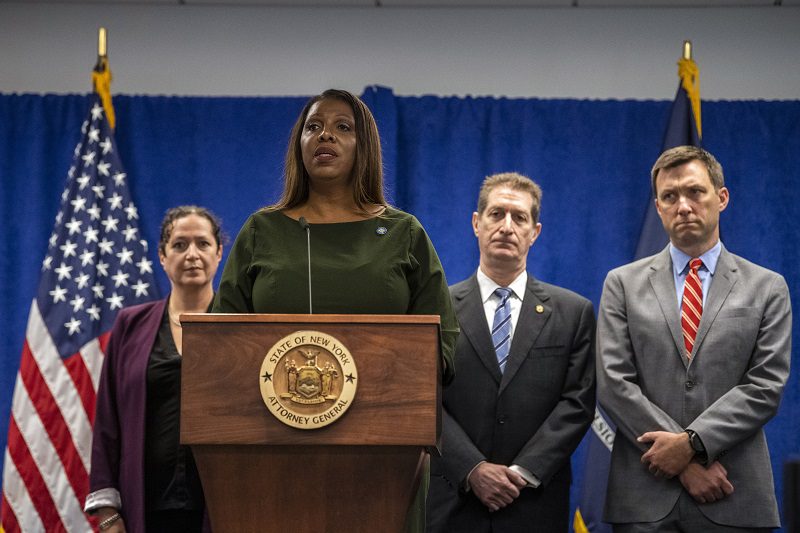New York AG’s civil lawsuit accuses former president Trump of insurance fraud

New York’s Attorney General has launched a civil lawsuit against former U.S. president Donald Trump alleging financial fraud, including allegations he “[induced] insurers to provide insurance coverage for higher limits and at lower premiums.”
New York Attorney General Letitia James’ lawsuit filed Wednesday in New York’s Supreme Court is civil in nature and not a criminal charge or indictment. The lawsuit alleges “the falsification of business records, and the commission of insurance fraud.”
None of the allegations contained in the lawsuit have been proven in court. Donald Trump referred to the lawsuit in ad hominem comments on his social media platform, Truth Social.
“Another Witch Hunt by a racist Attorney General, Letitia James, who failed in her run for Governor, getting almost zero support from the public, and is now doing poorly against Law & Order A.G. candidate highly respected Michael Henry,” Trump wrote. “I never thought the case would be brought — until I saw her really bad poll numbers.”
The New York attorney general’s lawsuit claims the named defendants — Trump, three of his children (Donald Trump Jr., Ivanka Trump and Eric Trump) and senior executives at the Trump Organization — “used fraudulent statements of financial condition to obtain millions in economic benefits.” Part of the relief sought is for the defendants to repay more than $250 million that the AG alleges was obtained fraudulently.
Among its other allegations concerning financial disclosure, the AG’s lawsuit accused the defendants of committing insurance fraud by submitting false and misleading statements, along with making other false representations, to obtain financial benefits under insurance policies from insurers participating in the Trump Organization’s surety program and directors’ and officers’ liability program.
Over the course of the surety program, based on financial disclosures made by the Trump Organization, the insurer agreed to “increasingly more favourable terms – periodically increasing the limits and decreasing the rate,” the lawsuit said.
For example, in 2011, the surety program had a single bond limit of $500,000, an aggregate limit for all bonds of $2 million and a rate of $20 per thousand, the AG’s lawsuit states. But when the surety program was cancelled in 2021, the single bond limit was $6 million, the aggregate limit was $20 million and the rate was $10 per thousand, according to the AG’s lawsuit.
As for the D&O coverage, the AG contends the liability coverage initially consisted of a single policy providing a limit of $5 million at a premium of $125,000. Similar to the surety coverage, the lawsuit alleges the Trump Organization “provided underwriters no more than fleeting access to Mr. Trump’s statement, through a monitored in-person review.”
Also, the Attorney General’s lawsuit alleges, at no time prior to the renewal of certain D&O policies did any representative disclose the existence of the Attorney General’s investigation into Trump family members who were directors and officers of the Trump Organization.
“They withheld this information despite their understanding and belief that the OAG [Office of Attorney General] investigation could potentially lead to a claim under the D&O coverage, as evidenced by the notice of claim they submitted to D&O insurers… seeking coverage in connection with OAG’s enforcement action resulting from the investigation.”
Overall, the lawsuit alleges the defendants inflated Trump’s net worth “by billions of dollars to induce banks to lend money to the Trump Organization on more favourable terms than would otherwise have been available to the company.” It also alleges Trump and his organization “knowingly and intentionally created more than 200 false and misleading valuations of assets on his annual statements of financial condition to defraud financial institutions.”
In conjunction with the lawsuit, the Office of Attorney General has referred the matter to the U.S. Attorney’s Office for the Southern District of New York and the Internal Revenue Service for criminal investigation.
Feature image: New York Attorney General Letitia James speaks during a press conference, Wednesday, Sept. 21, 2022, in New York. New York’s attorney general sued former President Donald Trump and his company on Wednesday, alleging business fraud involving some of their most prized assets, including properties in Manhattan, Chicago and Washington, D.C. (AP Photo/Brittainy Newman)



